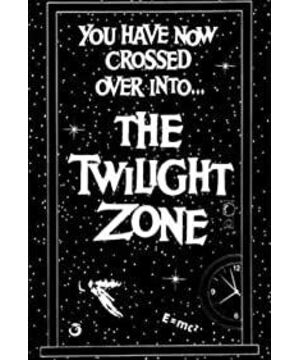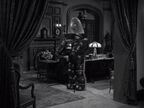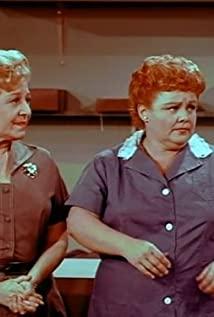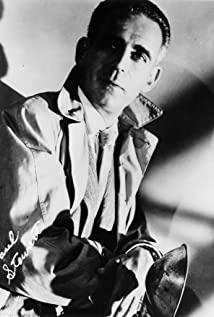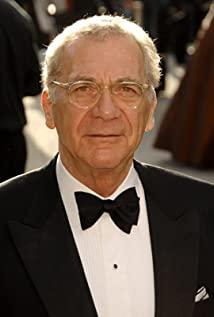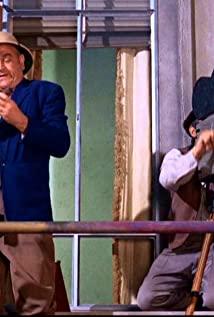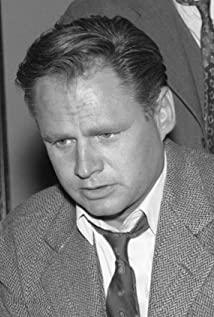Being like everybody is the same as being nobody. -Rod Serling
What is The Twilight Zone? There are various versions of its origin, such as a certain Air Force (one ocean) term, which refers to the moment when the horizon cannot be seen during flight (or the deepest point of the ocean that light can reach), and the extended meaning is an uncertain state, which is somewhat similar. The "grey area" in the Chinese context (emerged in some early 20th century texts), screenwriter Rod Selling himself put it: I thought I'd made it up, but I've heard since that there is an Air Force term relating to a moment when a plane is coming down on approach and it cannot see the horizon. It's called the twilight zone, but it's an obscure term which I had not heard before. (Interestingly, Selling during WWII Volunteered in the paratroopers and was injured), but as the show became famous, and even became a classic/cult, the name of the show gradually occupied the first righteousness (for the origin of this name, please refer to Saunders' blog and the discussion on the Internet). The three common Chinese translation names are Yin and Yang Demon World, Blurred Time and Space, and Strange Century (perhaps the more interesting version comes from Machine Translation: Twilight City). These words probably point to a certain boundary, transition, and ambiguous state. In fact, There is a line in one episode that directly refers to the limbo (a concept used in Inception 50 years later), which is a powerful reference - many episodes trace the soul wandering, hesitating, waiting for redemption (usually from some Awakening) archetype, that is to say, a psychological deduction of the concept of religion, thanks no doubt to the 20th century brilliance of psychoanalytic theory, including its artistic derivatives, where the abyss of human nature was recapitulated in some kind of brain In the theater of , psychological, fantasy, there are death gods, devils and guardian angels, or their psychological substitutes, which lead the characters to participate in reality, but not directly, because the traditional "charm" has been withdrawn into the individual. All games are psychological, and all mysteries are love words. We can also see this aspect in the films of Finch, Lynch and others in later generations. But there are also episodes, such as those space travel themes, where characters move around a given physical reality, to deal with and deal with sudden anomalies, the human state is more existential, pointing to some colder truth, such as The commensurability of man-animal-machine-creation-role (often full of reflexive implication of fiction), in short, for the "other", human beings do not have that kind of supremacy as an omniscient, but Just a wisp of smart smoke in the vast world. In my opinion, one of the most profound tensions in this drama is the lack of nature and the proliferation of man-made. Most of the story scenes are indoors, cabins, and sheds (of course, because of filming conditions), even if you live in aliens, The nature in the exterior is also set to be barren, harsh, lifeless, in short, the west (in Westerns), like the asteroid in episode 7, is a land of exile, in fact, in episode 36 we Can't see any classical scenes of birds and flowers, only the United States in 1959 (even accurate to the date) - mostly in New York, which is both the positioning of the TV series (fashion city) and the involuntary echo of modernity itself, like the first Modernity, as implied by the episode title Where is everyone, is symptomatic of the sweeping embrace of technology, throwing us into a questioning situation: Where are people, if there are artifacts everywhere? If we must generalize, it seems that we can generalize The Twilight Zone is regarded as some kind of derailment. The typical way of unfolding is that a person encounters a change, deviates from the normal orbit of life, and is thrown into some kind of chaotic and ambiguous situation. Some of them come from sci-fi settings (such as time travel), and some belong to strange forces. God - the narrator tells the background and characters, but does not explain the reason behind the plot, which is quite similar to what Benjamin said, "half the mystery of the art of storytelling is to avoid interpretation when telling", the important thing is to enter "abnormal", Living with it makes people aware of the things that were originally covered in life, that is, people's fears and desires, memories and imaginations, innocence and sentimentality. Many stories are moralistic, such as making a choice between wealth and human affection. There are Christian values in the style of "What a Beautiful Life". These chapters are very different from science fiction themes, rather they are a kind of moral comedy. But given the variety of scripts, there are also traces of Sellin himself—a Binghamton Jewish kid's reminiscence of small-town life, such as episode 5 or 30, that reminisces in the ever-changing war. In the post-bloom, there is also the meaning of sentimentality and death. The golden age of pastoral songs and harmonious neighborhoods is gone (perhaps it is only perfect in imagination), and there is only a desert of human feelings in front of us, but the world is far away, if we take our vision To be broader, this kind of change or decline of values also constitutes a watershed for modern novels. The meaning of the "transcendental world" mentioned in Lukacs' "Theory of the Novel" has collapsed, and the horizon on the earth has disappeared. is—in a metaphorical sense, precisely obscured by the high-rise buildings that give us a place to live. Ironically, in Sellin's vision, The Twilight Zone comes from the moment when you can't see the horizon while flying. Perhaps, these bizarre stories are a call to reunite humanity in some mysterious, borderline in a state of being, in order to reveal our fading, but not yet lost, human experience. The experience may be mysterious and unexplained, but the telling of it makes it believable, or as the last episode says, materialized. In Sellin's own words: The Twilight Zone is what it implies: that shadowy are of the almost-but-not-quite; the unbelievable told in terms that can be believed.
This experience is also multiple. From a certain point of view, Selin is using The Twilight Zone as a kind of container, containing all the indescribable things, whether it is miracles, monsters or aliens, you can find it here— — Here, the mystery still exists in its integrity. Twilight Zone, on the other hand, is also the name of the show, and each episode is a promotion for the series - here, you can always consume a great story during the half-hour that airs on CBS every Friday. As the product positioning of TV series, what he wants to cover is the most popular and mainstream moral and aesthetic concepts in American society, which may explain those slightly conservative views of good and evil, and also reflect those themes of the times: the Cold War, McCarthy Islamism, baby boomers and economic growth, the space arms race, nuclear deterrence, highly competitive jobs, addictions, and more. War stinks, Selin said in one episode by the characters, you can feel that emotion, straight, sharp, ironic, like a modern witch hunt in 22 episodes, where Selin makes the story fire at the same time With fireworks, towards the darkness, let the darkness have nowhere to escape. As a black-and-white show, there's also considerable visual design, including the clever use of surreal elements - most notably, the opening animation, reminiscent of the unsettling scenes of Dali and Chirico. Paintings (also an experience of modernity), photography highlights are everywhere, such as the scheduling of mirror surfaces, and lighting with film noir imprints, see episodes 1, 12, and 34. Some scenes will remind you of movies like "The Godfather" and "The Man with No Name" in later generations.
Standing 60 years later, how should we evaluate this series? What does this 20-minute episode of short stories bring us? It is difficult for any answer to summarize its influence. As Stephen King said, "it has opened up thousands of fascinating possibilities", so that in the "high concept" film and television of later generations, from "The Truman World" to "The World of Truman" Horror Cruise", from "Black Mirror" to "Secret No. 9", can always find its shadow. It is the creator's vein, spring and seed. Just like the original intention of broadcast, it is spread on the land of fictional creation. People are constantly nourished. In some ways, this is one of the clearest continuations of the countless bleak experiences of the 20th century. If American dramas with main plots are the equivalent of nineteenth-century novels, then we can also say that Sellin is like the Borges of the TV world, and he also said something like Borges said: Anonymity is fine with me. My place is as a writer. In a way, he even said that he disappeared and the Twilight Zone survived - we can understand that he exists in the form of a play, although Selin himself in 1975 Died of heart surgery. As a netizen on IMDb commented:
Aliens and monsters are just a small part of the show, the real star is Selin's imagination.
View more about The Twilight Zone reviews


